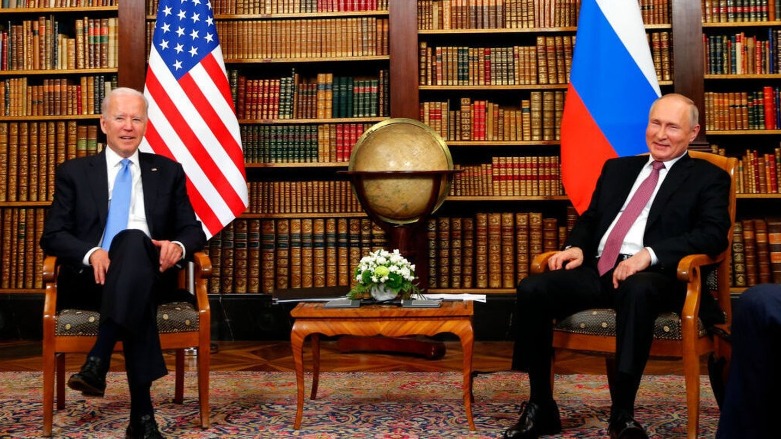Biden, Putin exchange warnings amid continued Ukraine tensions
Biden and Putin spoke on Dec. 7, and Thursday’s phone call, their second exchange this month, was held at Putin’s request.

WASHINGTON DC (Kurdistan 24) – US President Joe Biden and Russian President Vladimir Putin held a 50-minute phone call on Thursday in which each leader threatened the other with serious consequences over hostile actions in relation to Ukraine.
Biden and Putin spoke on Dec. 7, and Thursday’s phone call, their second exchange this month, was held at Putin’s request.
Russia has mobilized some 100,000 troops along its border with Ukraine, and the US and Europe fear Russia will attack Ukraine in January, once the ground is frozen hard enough to support the movement of tanks.
Biden has said that the US will not intervene with its own military forces, but on Thursday, he repeated what he had told Putin in their Dec. 7 discussion: Russia would face punishing economic sanctions, if it further attacked Ukraine.
On Thursday, Putin responded harshly, warning that such a move would lead to “a complete rupture of relations.” Such measures would be a “colossal mistake that would entail grave consequences,” as a senior foreign policy adviser, Yuri Ushakov, told reporters after the presidents’ discussion.
“Many such mistakes have already been made over the past 30 years”—i.e., since the collapse of the Soviet Union—and “It is advisable,” Ushakov continued, “not to make such mistakes in this situation.”
Biden also said, as a senior administration official told journalists after the discussion, that the US would strengthen its military position in other Eastern European states to deter any further Russian attack, while it would provide “additional assistance to Ukraine to enable it to further defend itself and its territory,” contributing to prospects for a Ukrainian insurgency against Russian forces, should they attack.
According to a summary of the discussion released by White House Press Secretary Jen Psaki, Biden “urged Russia to de-escalate tensions with Ukraine” and “made clear that the United States and its allies and partners will respond decisively if Russia further invades Ukraine.”
Biden’s position was not really different from that he expressed in his Dec. 7 exchange with Putin, but Putin’s position on Thursday, as described by Ushakov, was tougher and more threatening.
Indeed, ten days after Putin’s first discussion with Biden, Russia, on Dec. 17, issued demands for “sweeping new security guarantees,” as The Washington Post characterized them. The Post described Moscow’s new demands as an effort “to rework the consequences of the Soviet Union’s collapse in 1991.”
Russia insisted that NATO must remove all its military infrastructure in Eastern Europe installed after 1997. In addition, Moscow said that NATO should commit to undertaking no military action outside of NATO countries and that no other Eastern European country—including Ukraine and Georgia—be admitted to the alliance.
Neither the US nor NATO are prepared to provide such guarantees—which would essentially give Moscow a veto over their policies. But they did agree to hold talks with Russia.
On Jan. 10, US Deputy Secretary of State Wendy Sherman will meet Russian Deputy Foreign Minister Sergei Ryabkov in Geneva. That will be followed by a meeting on Jan. 12 between NATO and Russia and a third meeting on Jan. 13 at the OSCE (Organization for Security and Cooperation in Europe), whose membership includes the US, Russia, Ukraine, all the European countries, and Turkey, as well.
The US has made clear that it will be coordinating closely with its allies and partners in advance of the talks.
Despite the flurry of scheduled meetings, the basic situation remains unchanged and tense.
Asked whether the Russians had made any conciliatory statements, easing tensions, the senior administration official who briefed reporters on Thursday responded that the US focus was “on actions and on indicators, not on words,” while the US would “continue to monitor very closely the movement and buildup of Russian forces on the Ukraine border and prepare ourselves for whatever decision ultimately is made by the Russian president.”